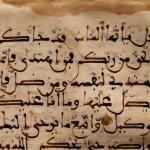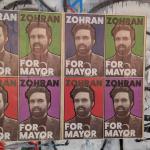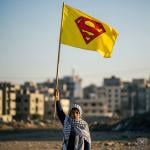 |
|
Was it a good year?
|
Was there any good news for the Muslim community in 2002? In many ways, 2002 seemed as much an annus horribilus as its predecessor. Muslims in America and abroad endured the continuing ?war on Terrorism?, the institutionalization of homeland security, the pogrom in Gujurat, the fallout after the Bali and Kenya bombings, mass detentions, and the promise of even more war and death in the Middle East. But, there were some points of light in an otherwise discouraging year.
1. Islam blooms in Rwanda in wake of genocide
In 100 days in 1994, Rwanda?s tiny Muslim minority found itself a witness to the fastest, largest killing spree of the last century ? a gruesome genocide that was aided and abetted by an indifferent international community, including the United States. (Read ?Bystanders to Genocide?, Samantha Powers? award-winning critique of Clinton?s response to Rwanda, which appeared in the September, 2001 issue of the Atlantic Monthly.) The genocide resulted in the murder of 800,000 men, women, and children as Hutus killed Tutsis in largely-Christian Rwanda. Slowly, reconciliation has come to Rwanda, and Islam has played an important role in the country?s healing process largely due to the courage and bravery of Muslims, who provided sanctuary to victims, rescuing hundreds during the genocide. Truth commissions have revealed how many Christian priests themselves became genocidaires and slaughtered innocents.
2. African Muslims lead jihad against HIV-AIDS
While ?imam? and ?Madrassah? have become bad words in the mouths of Islamophobes and apologists alike, Uganda?s madrassahs and Imams have long joined the African country?s Islamic Medical Association to fight a successful Jihad against the greatest challenge of our time: AIDS. The strategy devised by Ugandan Muslim leaders, which has emphasized womens? empowerment, has also included interfaith outreach. The United Nations ? which warns that HIV/AIDS poses a greater threat to global security and health than terrorism ever could ? promotes the programs of the Islamic Medical Association of Uganda and a sister Senegalese Muslim group JAMRA as best practices in AIDS prevention work.
3. Pro-Muslim party wins landslide in secular Turkey
Turkish voters frustrated by incompetence and corruption pulled an electoral rabbit out the hat in November. They denied the ruling party a single seat in parliament and instead helped the pro-Muslim Virtue party to an unprecedented victory. Virtue party leaders Reccep Tayyip Erdogan and Abdullah Gul, who had been involved in Turkey?s Islamic movement since their student days, promised the Turkish electorate honesty, accountability, an economic turnaround ? and EC membership and human rights. Pushing for EC membership helps Erdogan and Gul establish secularist street cred with the Turkish military ? ever-leery of Muslim encroachment on power ? and with the Europeans ? ever-leery of Muslim encroachment on power. At the same time, to be EC-eligible, Turkey will have to permit more religious freedoms and reduce the power of the military ? just what Virtue?s leaders want.
4. Israeli refuseniks say no to occupation
Growing numbers of young Israelis are refusing military service to enforce the occupation in the West Bank and Gaza. Many ? some straight out of high school ? are currently serving jail terms for their courageous conscientious objection. Those who refuse have been subject to ridicule, besides poor employment and education prospects. Recently, a few hundred high school students wrote a letter to Ariel Sharon, refusing to be part of the occupation. Even battle-tanks need drivers; even Apache helicopters need pilots.
5. Bahraini women gain suffrage
Democracy and women won victories in Bahrain. The tiny Persian Gulf island state joined Middle East countries Israel, Iran, Qatar and Turkey when it granted women suffrage. Although no woman candidate won a seat in Bahrain?s parliament, a member of the country?s minuscule Jewish minority did win.
6. Sarajevo Hagaddah preserved
A 600 year-old Jewish prayer book that survived the Spanish Reconquista, the Nazi Holocaust and the Bosnian Genocide of the early 1990s went on public display in Sarajevo. The Sarajevo Hagaddah, a Passover prayer manual, is a testament to Bosnia?s heritage of tolerance and the Muslim heroes that aided in its preservation. The book came to Bosnia after 1492 with a Jewish family fleeing persecution in Spain. During World War II, an Imam helped a Muslim and a Catholic pair of curators to hide the prized book from the Nazis under the doorstep of a village mosque. In 1992, Enver Imamovic ? the Muslim director of Bosnia?s National Museum ? braved sniper fire and shelling to rescue the Hagaddah. Soon thereafter, the Serbs destroyed both the National Museum and the Library?s 1.5 million books, in what is said to be the largest single book-burning in history.
7. American Muslims reach out through interfaith activism
Coalition-building Muslims were surprisingly proactive as the anniversary of September 11th approached. Muslim communities and organizations planned or participated in memorials, marches, services, and other gatherings that brought together a broad spectrum of friends and allies. Whether it was joint vigils and or joint statements, American Muslims could be seen with Japanese-American survivors of WWII internment camps, civil libertarians, or progressive Christians. The post-9/11 era has seen not only an explosion of interfaith and outreach activity, but also a affirmation by the community of actively seeking friendship with our neighbours.
8. International Solidarity Movement supports Palestinians
Although peace activists from Europe and North America have been going to the Occupied Territories since the beginning of the Al-Aqsa Intifada, the mainstream media largely ignored them. That changed when Israel invaded Ramallah and held Yasser Arafat hostage. International activists served as human shields, as witnesses on the ground, and supported Palestinian and Israeli peace groups. American Jewish peace activist Adam Shapiro kept Arafat company as Israeli troops surrounded the Chairman?s compound , as did Israeli Jewish activist Neta Golan who also helped Palestinians harvest olives. American Muslim activists on relief and solidarity trips were often either detained or deported, or both.
9. Extremist Hindu charity exposed by diverse alliance of South Asians
A hodgepodge group of Internet chatters, frustrated by the growing power of Hindu fundamentalists in India and their funders in America, teamed up to become an effective activist outfit. Calling themselves The Campaign to Stop Hate, the group launched Project Saffron Dollar, to help uncover the fundamentalist money trail that funds hate and violence in India. Their first target: the Indian Development and Relief Fund, a group activists say is a money front for the same Hindu hate groups that killed Mahatma Gandhi. In November, the Campaign released a well-documented report that convinced companies like Cisco to stop giving matching funds to the IDRF through their Indian employees.
10. Rumi remains America?s best-selling poet
The genius poet of Islam ? a Hanafi Mawlana by training ? continues to strike a deep chord within the American psyche. With Madonna, Demi Moore, Donna Karan and Deepak Chopra all singing his praises, Rumi?s couplets are fast becoming part of the American canon. Amazing for a medieval Alim who was born in present day Afghanistan, lived in Anatolia, and wrote in Persian. “Rumi is the voice of unconditional love,” says Rumi translator Kabir Helminski. “He is willing to talk about his own pain, for instance, the pain of loving God, the pain of being human.”
Mas’ood Cajee is a dentist and writer who lives in Northern California.











